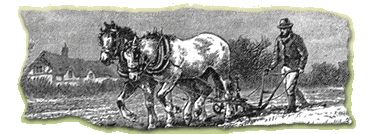

The Yorkshire Farmer
Farm implements,
Farming,
Wife,
Farm animals
Archival information
Lyrics
1
There was an ord farmer iv 'Arton did dwell, (ord = old, Harton)
Iv 'Arton 'e lived and you all know 'im well.
'E gav tiv 'is lads a cord tatie pie, (cord = cold)
Withoot a bit o' meat in, and that's not a lie.
2
When ah cum tiv 'Arton 'twas iv a Settherday neet,
The rattle in their bellies was enough ti give yer freyt,
Then the tahm cums, ah taks mi seeat,
Up comes a tatie pie and a ruddy great lump o' meeat.
3
Noo we're threshin' bi steam and there's water fer ti lead,
There's yan fer ti dhrave and another fer ti feed,
There's yan up a height and there's yan doon below,
There's two to carry corn and there's a couple jackin' straw.
4
Noo we 'ev six 'osses, they all are varry thin,
You can coont ev'ry beann as it lays in the skin, (beann = bone)
There's three lame in t' leg, there's three swung in t' back,
But they gang varry weel tiv a 'Warve gee back!'
5
Noo, all you young lads as wants ti learn ti ploo,
You want ti gan tiv 'Arton and they'll show yer how,
Or if it be right as ah've 'eard 'em say,
They'll mak yer ploo five yacker iv a day. (yacker = acres)
6
Noo, all you young lasses as wants ti get fat,
You want ti gan tiv 'Arton and wear a white 'at.
There's pies made of iron and there's puddens made o' bran,
And the' rattle in your bellies like an ord tin can.
7
We 'ad an ord yow, she deed a fortnit today,
She must 'a' been fat, cos I 'eard foreman say,
'Bring 'er up, bullocky, bring 'er up on t'sly,
She'll mak these lads some rare mutton pie.'
8
She come onti table reekin' yat, (yat = hot)
Inches thick wi' mawks i' ruddy fat,
The' couldn't crawl off plate sae we 'ad 'em ti eat,
But as foreman says, 'Lads, they're all fresh meeat.'
9
Noo up comes gaffer wiv 'is 'at all of a side,
A handful o' rye and 'is beard all dry.
Burr if yer can't live decent ah think it is a sham, (sham = shame)
An ah's gan ti 'av a word wi' oor ord man.
Recorded at his home, The Old Chapel, Bossall, 21st April 2006.
Archival information
This is a traditional song about Yorkshire, collected in Yorkshire.
Provenance
Universally associated with North East Scotland, 'bothy ballads' were composed and sung by hired farm workers who were housed in a 'bothy', often little more than a hovel, in very poor conditions. All of the hired lads, except sometimes the foreman, slept in this makeshift dormitory, sometimes a loft above the cattle byre or stables. Farms were often too remote from towns and villages for the lads to live at home and commute and there was little or no public transport even if this were feasible. Invariably these bothy ballads made wry comments on the conditions on various farms, and often were adapted from describing one farm to another. Given the conditions their composers had to endure it is quite likely that many of them were communal compositions.
Similar conditions prevailed during the nineteenth century on Yorkshire Wolds farms. Farms tended to be large, often part of a large estate, and labour was scarce so a similar system to North East Scotland prevailed, with all of the young male workers sharing a shed or a barn loft. This system prevailed on the Wolds right upto World War Two. Mutton Pie, its more common title, then is one of the few bothy ballads found outside Scotland. Although it probably originated on the Wolds farms, it is known throughout the East Riding and has spread into north Lincolnshire and the North Riding. It is as popular in the East Riding as An Acre of Land TYG23. A related song of three stanzas is sung in South Yorkshire and the Midlands in which the dead sheep has become an old sow. (See An East Riding Songster, Gardham, p48 and The South Yorkshire Songbook, Davenport, p12).
In the East Riding it has developed two equally strong tunes with different choruses:
'To me whack—fol—the diddle all the day,
To me whack fol the diddle all the day.'
Or:
'Fol the diddle-i-do, fol the diddle day.'
Norman's version, the longest I have come across, has no chorus, but the tune is the one associated with the second given above. One of our singers, John Greaves, had heard of a Rookdale version with fifty or more verses.
Harton is just to the north of Bossall, both between the A166 and A64 a few miles north of Stamford Bridge.

